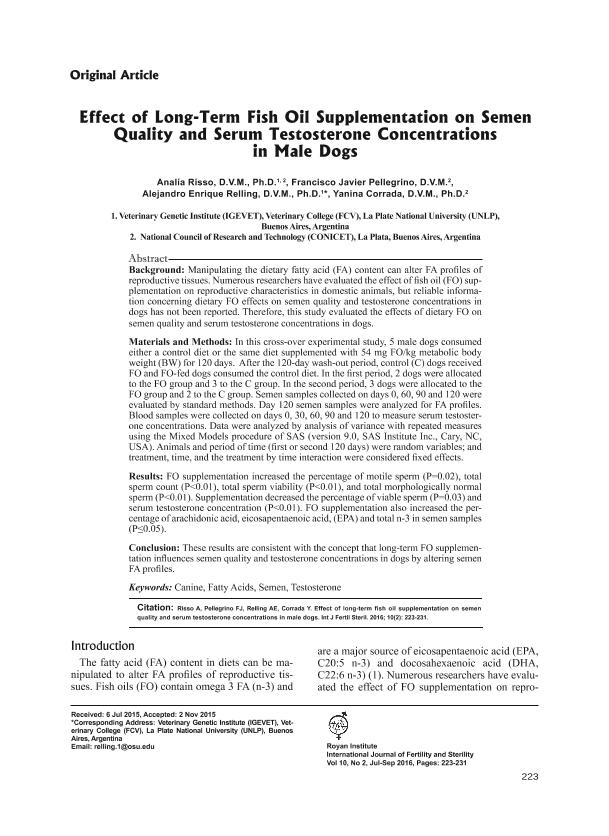Artículo
Effect of long-term fish oil supplementation on semen quality and testosterone concentrations in male dogs
Risso, Analia Lorena ; Pellegrino, Francisco Javier
; Pellegrino, Francisco Javier ; Relling, Alejandro Enrique
; Relling, Alejandro Enrique ; Corrada, Yanina Alejandra
; Corrada, Yanina Alejandra
 ; Pellegrino, Francisco Javier
; Pellegrino, Francisco Javier ; Relling, Alejandro Enrique
; Relling, Alejandro Enrique ; Corrada, Yanina Alejandra
; Corrada, Yanina Alejandra
Fecha de publicación:
07/2016
Editorial:
Royan Inst
Revista:
International Journal Of Fertility And Sterility
ISSN:
2008-076X
e-ISSN:
2008-0778
Idioma:
Inglés
Tipo de recurso:
Artículo publicado
Clasificación temática:
Resumen
Background: Manipulating the dietary fatty acid (FA) content can alter FA profiles of reproductive tissues. Numerous researchers have evaluated the effect of fish oil (FO) supplementation on reproductive characteristics in domestic animals, but reliable information concerning dietary FO effects on semen quality and testosterone concentrations in dogs has not been reported. Therefore, this study evaluated the effects of dietary FO on semen quality and serum testosterone concentrations in dogs. Materials and Methods: In this cross-over experimental study, 5 male dogs consumed either a control diet or the same diet supplemented with 54 mg FO/kg metabolic body weight (BW) for 120 days. After the 120-day wash-out period, control (C) dogs received FO and FO-fed dogs consumed the control diet. In the first period, 2 dogs were allocated to the FO group and 3 to the C group. In the second period, 3 dogs were allocated to the FO group and 2 to the C group. Semen samples collected on days 0, 60, 90 and 120 were evaluated by standard methods. Day 120 semen samples were analyzed for FA profiles. Blood samples were collected on days 0, 30, 60, 90 and 120 to measure serum testosterone concentrations. Data were analyzed by analysis of variance with repeated measures using the Mixed Models procedure of SAS (version 9.0, SAS Institute Inc., Cary, NC, USA). Animals and period of time (first or second 120 days) were random variables; and treatment, time, and the treatment by time interaction were considered fixed effects. Results: FO supplementation increased the percentage of motile sperm (P=0.02), total sperm count (P<0.01), total sperm viability (P<0.01), and total morphologically normal sperm (P<0.01). Supplementation decreased the percentage of viable sperm (P=0.03) and serum testosterone concentration (P<0.01). FO supplementation also increased the percentage of arachidonic acid, eicosapentaenoic acid, (EPA) and total n-3 in semen samples (P≤0.05). Conclusion: These results are consistent with the concept that long-term FO supplementation influences semen quality and testosterone concentrations in dogs by altering semen FA profiles.
Palabras clave:
Canine
,
Fatty Acids
,
Semen
,
Testosterone
Archivos asociados
Licencia
Identificadores
Colecciones
Articulos(IGEVET)
Articulos de INST.DE GENETICA VET ING FERNANDO NOEL DULOUT
Articulos de INST.DE GENETICA VET ING FERNANDO NOEL DULOUT
Citación
Risso, Analia Lorena; Pellegrino, Francisco Javier; Relling, Alejandro Enrique; Corrada, Yanina Alejandra; Effect of long-term fish oil supplementation on semen quality and testosterone concentrations in male dogs; Royan Inst; International Journal Of Fertility And Sterility; 10; 2; 7-2016; 223-231
Compartir
Altmétricas



